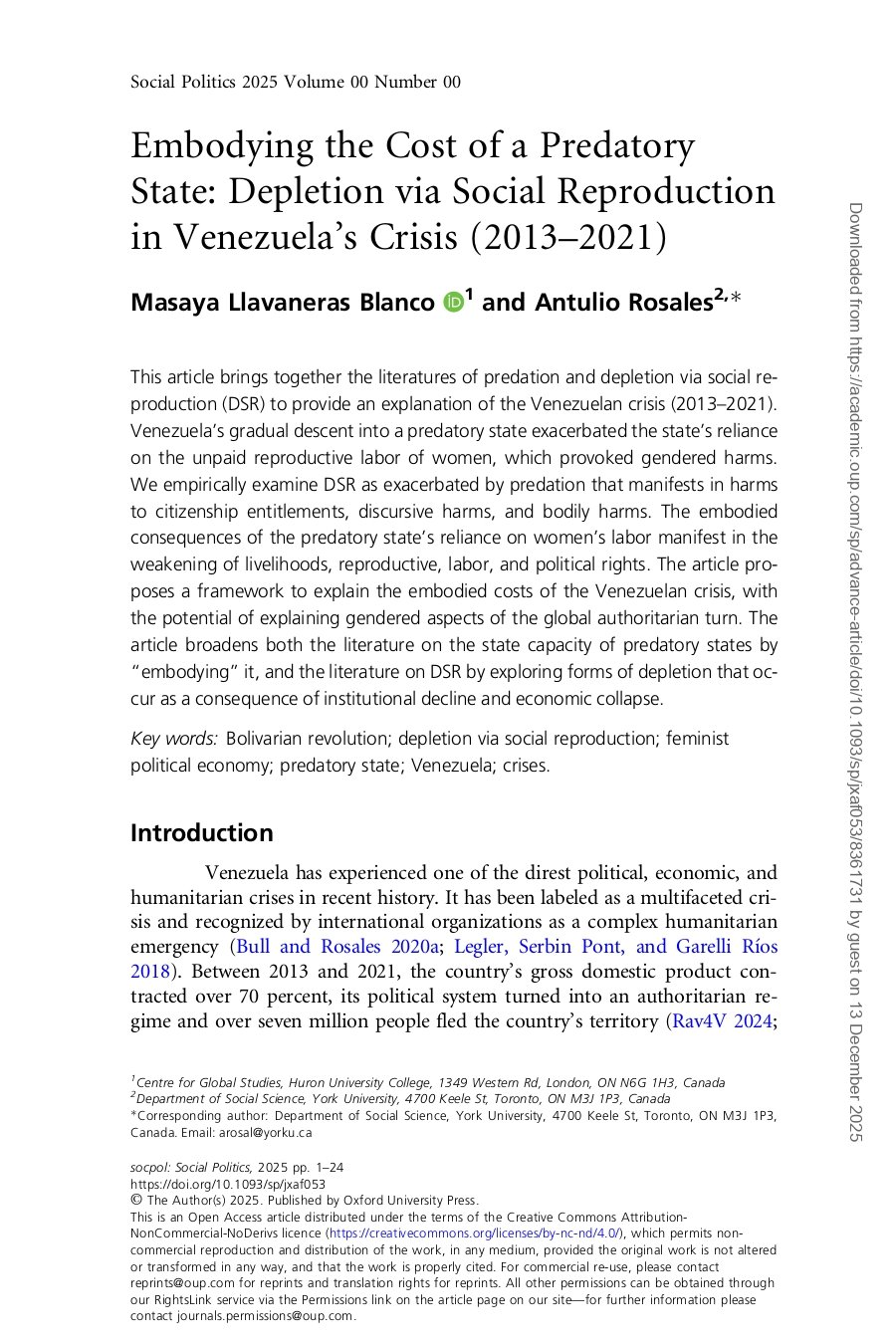Embodying the Cost of a Predatory State: Depletion via Social Reproduction in Venezuela’s Crisis (2013–2021)
Llavaneras Blanco, M and Antulio Rosales (2025) “Embodying the Cost of a Predatory State: Depletion via Social Reproduction in Venezuela’s Crisis (2013–2021)”, Social Politics: International Studies in Gender, State & Society; jxaf053, https://academic.oup.com/sp/advance-article/doi/10.1093/sp/jxaf053/8361731
This article brings together the literatures of predation and depletion via social reproduction (DSR) to provide an explanation of the Venezuelan crisis (2013–2021). Venezuela’s gradual descent into a predatory state exacerbated the state’s reliance on the unpaid reproductive labor of women, which provoked gendered harms. We empirically examine DSR as exacerbated by predation that manifests in harms to citizenship entitlements, discursive harms, and bodily harms. The embodied consequences of the predatory state’s reliance on women’s labor manifest in the weakening of livelihoods, reproductive, labor, and political rights. The article proposes a framework to explain the embodied costs of the Venezuelan crisis, with the potential of explaining gendered aspects of the global authoritarian turn. The article broadens both the literature on the state capacity of predatory states by “embodying” it, and the literature on DSR by exploring forms of depletion that occur as a consequence of institutional decline and economic collapse.
OPEN ACCESS
https://doi.org/10.1093/sp/jxaf053
The intimate-mobility entanglement: Subaltern trajectories in the Haitian-Dominican borderlands
Llavaneras Blanco, Masaya (2022) “Subaltern trajectories: The entanglement between human mobility and the intimate in the Haitian-Dominican borderlands.” In Environment and Planning C: Politics and Space.
This article argues that intimacy and human (im)mobilities are interrelated, and that this relationship is integral to the way borders function and are experienced. I propose the concept of intimate-mobility entanglement to describe this relationship of interdependence. Based on primary research conducted with Haitian domestic workers that work in the Dominican Republic (DR), the article illustrates how intimate labour functions as a driver and a strategy for human (im)mobility. The article characterizes the interactions between (im)mobility and intimacy as a relationship of entanglement that is observable in domestic work, childrearing, intimate violence, border crossing and access to the right to nationality. The article centers on the spatial trajectory of Marie, a Haitian woman who works as a domestic worker in a Dominican border town after having lived and worked in several towns in the DR for twenty years. Marie’s spatial trajectories illuminate how the intimate-mobility entanglement is integral to the Dominican border regime. Through individual interviews, participant observation and mapping Marie’s journeys through Haitian and Dominican territories, the article revisits her spatial trajectories and sheds light on the dual relationship between the intimate-mobility entanglement and the border regime. On the one hand, the entanglement intervenes in the way the border is reinforced in the actual border strip while it also stretches out into Dominican territory. On the other, the border regime conditions Marie’s labour, how she moves and settles down, and influences how intimate labours are carried out and experienced. Building on a tradition of feminist and subaltern geographies, as well as on mobilities literature, the article presents a contextualized analysis of the politics of subaltern mobilities and explains how intimacy and intimate labours are critical aspects of how borders work.
Intimate bordering: Intimacy, anti-blackness and gender violence in the making of the Dominican border
Llavaneras Blanco, Masaya (2022). Intimate bordering: Intimacy, anti-blackness and gender violence in the making of the Dominican border. Political Geography, 99, 102743.
This article proposes the term Intimate Bordering to explain the role of intimacy and social reproduction in the active process of border-making and statecraft. The concept contributes to understanding daily experiences of bordering among subaltern subjects who make and contest the border every day and yet are often unaccounted for. The concept sheds light on how racialized and gendered relations of power intrinsic to antiblackness and cis-hetero-patriarchy interweave and condition spatial politics and belonging. These arguments are developed by bridging border studies and black and feminist geographies, and by centering the experiences of Haitian women who work as domestic workers in Dominican border towns. The article is based on fieldwork carried out in four Dominican and Haitian border towns, including interviews, focus groups and participant observation focused on the everyday commutes of Haitian domestic workers who live in Haiti and work in the Dominican Republic (DR). It analyzes two sets of intimate border practices that take place at two official border crossings: the first set includes normalized forms of intimate violence and humiliation at the border; the second examines the failed attempt at institutionalizing the transborder mobilities of domestic workers based on colonial entitlements of control over the bodies of black Haitian women. Centering intimacy in bordering brings transnational livelihoods, social reproduction and racialization into the heart of the analysis of statecraft projects in the space of the Afro-Caribbean.
The travels of an exotic bird: The transnational trajectories of Venezuela’s constitutional recognition of the value of unpaid work
Llavaneras Blanco, Masaya (2017) “The travels of an exotic bird: The transnational trajectories of Venezuela’s constitutional recognition of the value of unpaid work.” In Global Social Policy, 17(3), 328-346.
The 1995 Beijing Platform for Action (BPfA) established a global norm to recognize the economic value of unpaid care work across the world. In 1999, Venezuela became the first of three South American countries to enshrine a similar norm with its Constitution in its Article 88. I argue that despite the temporal proximity of the two events and the global significance of the BPfA, the global norm only served partially as a tipping point for Venezuela. Taking an analytical framework that underscores the role of norm-takers, this article demonstrates that other, national, regional and transnational interactions led by national actors in national and regional arenas were as important as Beijing ‘95 for the development of Article 88.



